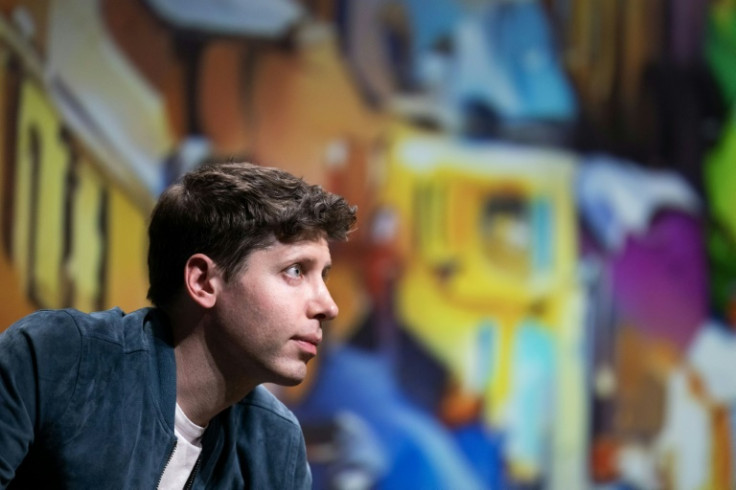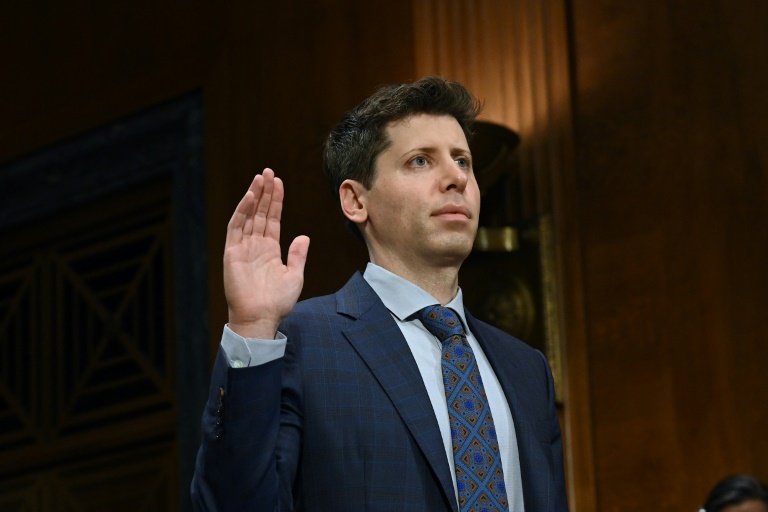
OpenAI CEO Sam Altman seemed to confirm his company is under investigation by the Federal Trade Commission.
AFP
Regulation is coming to the free-for-all world of artificial intelligence.
On Thursday, the Washington Post published a leaked document indicating the Federal Trade Commission is opening an investigation into OpenAI, the maker of ChatGPT and other AI-powered tools that are shaking the worlds of business and entertainment.
In an interview with International Business Times, Juliana Gruenwald Henderson, a spokeswoman for the FTC, said the federal agency charged with enforcing federal competitive and consumer protection laws could not confirm the veracity of the leaked letter. The FTC, she told IBT, doesn’t comment on or confirm the status of ongoing investigations.
On Twitter, OpenAI CEO Sam Altman seemed to confirm his company is under investigation.
“It is very disappointing to see the FTC’s request start with a leak and does not help build trust,” Altman tweeted on Thursday. “That said, it’s super important to us that out technology is safe and pro-consumer, and we are confident we follow the law.”
it is very disappointing to see the FTC’s request start with a leak and does not help build trust.
that said, it’s super important to us that out technology is safe and pro-consumer, and we are confident we follow the law. of course we will work with the FTC.
— Sam Altman (@sama) July 13, 2023
According to the leaked civil investigative demand schedule, the FTC is looking into whether OpenAI is “engaged in unfair or deceptive privacy or data security practices or engaged in unfair or deceptive practices relating to risks of harm to consumers, including reputational harm.”
Along with its most famous product ChatGPT, OpenAI created the image generation platform DALL-E, which uses prompts to generate various original images. These novel technologies are sending shockwaves through academia, publishing and media but are not currently regulated by the U.S. government.
In an interview, Center for AI and Digital Policy President Marc Rotenberg confirmed the FTC is investigating OpenAI. He said this is the first step toward federal regulation of the powerful product.
“We need more oversight and accountability for AI systems than we currently have,” Rotenberg told IBT. ”The technology is way out ahead of the regulation and the gap just keeps getting wider.”
Rotenberg, also an adjunct professor at Georgetown University Law Center, said the Washington-based CAIDP played a role in getting the investigation started by filing its own complaint with the FTC in March.
AI technologies like ChatGPT need some kind of regulation to protect consumer privacy and improve overall cybersecurity, Rotenberg said. Even the leaders of OpenAI are asking for regulation. Although, he said, the company would prefer to write its own rules.
Beyond the fears of AI sentience, which Rotenberg said are somewhat overblown, AI brings significant risks to consumers. He said ChatGPT’s language can be used by nefarious actors to facilitate online consumer fraud and other criminal activity.
Generated text can also be very persuasive and used by bad actors to pursue their political objectives online. AI writing like ChatGPT also creates so-called hallucinations, or statements that look true and sound convincing but are actually false.
Moreover, the U.S. is lagging behind other countries in establishing rules surrounding the technologies. China, South Korea and Italy, Rotenberg said, already have rules in place on AI technology. Lawmakers in Congress are crafting domestic rules, but the FTC may be charged with creating the first draft, he added.
The most important development in regulation may come from the European Union. The political bloc is developing its own set of regulations which are expected to be finalized by the end of 2023. Much like the EU’s General Data Protection Regulation, Rotenberg said the European law could set the international agenda for AI.
It’s hard to say how long the FTC investigation will take and what exactly it will yield. Rotenberg’s experience indicates it could take anywhere from two months to two years to finalize.
In the meantime, businesses — particularly those that rely on writers, editors and artists — will continue to be challenged by AI technology threatening to replace employees and upend established processes.
Additionally, everyone around the world is effected by the wave of change inspired by AI even if they aren’t aware of it. Rotenberg said AI is already used to make hiring, credit, housing, scholastic admission and even criminal sentencing decisions.
“AI techniques are being widely deployed right now without sufficient oversight and legal accountability,” Rotenberg said. ”That almost certainly leads to problems.”
Artificial intelligence
2023-07-19 22:00:04
Article from www.ibtimes.com
